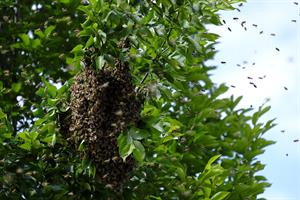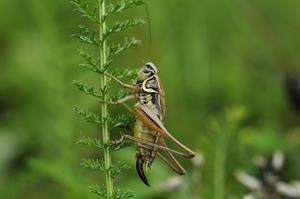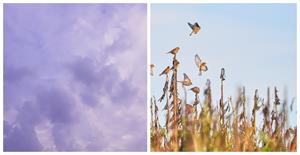PDF chapter test TRY NOW
The speaker begins the poem by announcing his intentions to the reader, stating that he will "arise and go now" to the isle of Innisfree.

Innisfree, Ireland
If you observe, you would realise that the word "go" is used twice in the first line. This is to emphasise the importance of the speaker's desire to go to Innisfree. The speaker has set his mind on his journey to Innisfree.
The poem’s second line gives more information about what he plans to do when he arrives at Innisfree. He intends to build himself a small cabin using clay and wattles. The line reveals the speaker's intention to live a minimal life. What he desires most is to live amid nature. This is also one of the major themes of the poem.

The speaker intends to live in a cabin (up); wattle fence (down)
The speaker further states that he dreams of having nine rows of bean plants and a hive for honeybees at his cabin in Innisfree.
The speaker is particular about having nine bean-rows. This could be an allusion to the nine fruits of the holy spirit, namely love, joy, peace, patience, kindness, goodness, faithfulness, gentleness, and self-control.

Bean-rows - top (left) and front (right) views
Also, speaking of the honeybee, there could be yet another allusion. Bee is a symbol of devotion and selflessness. The aspect of devotion could be seen in the way they revere their queen. On the other hand, honeybees work not merely for themselves. As St. John Chrysostom wrote, “The bee is more honoured than other animals, not because she labours, but because she labours for others".** Moreover, beekeeping is an ancient Catholic tradition, and hives were frequently kept on monastery grounds to provide honey for medicinal, food, and wax purposes.
Hence, through beekeeping, the speaker could be desiring a life that is selfless, devoted, and, at the same time, satisfies just the primary needs of a human, namely, food, livelihood, and medicine.
As we come to the final line of the first stanza, we are told that the speaker wants to live alone in an area filled with the sound of bees. It is ironic because bees survive in a company while the speaker desires to live alone. However, what is evident through the first stanza is that the speaker desires to live a simple life in accordance with nature.
Hence, through beekeeping, the speaker could be desiring a life that is selfless, devoted, and, at the same time, satisfies just the primary needs of a human, namely, food, livelihood, and medicine.
As we come to the final line of the first stanza, we are told that the speaker wants to live alone in an area filled with the sound of bees. It is ironic because bees survive in a company while the speaker desires to live alone. However, what is evident through the first stanza is that the speaker desires to live a simple life in accordance with nature.

Bees and their hive
The second stanza explains why the speaker desires to take up the journey to Innisfree. He associates the isle of Innisfree with peace. He says that he "shall have some peace there". Furthermore, the speaker describes the manner in which peace arrives. He says, 'peace drops slowly' as the night breaks into dawn. The speaker uses imagery to explain the concept of peace here.

Peace comes dropping slow from the veils of the morning
Cricket's song is usually associated with nighttime. Hence, the speaker is trying to paint the image of dawn where the sun rays can be seen slipping slowly through the skies to reach the earth that is still dark (as the cricket could be heard singing). Peace drops slowly from the veils of the morning to the earth that is still asleep.

A cricket
Innisfree is nature bound, and hence, time seemingly moves slower there than in the city. Thus, the peace that the speaker years for is both slow and tranquil. Unlike the city, the night at Innisfree is filled with glimmer, probably from the moon, stars, or even fireflies.
Innisfree is nature bound, and hence, time seemingly moves slower there than in the city. Thus, the peace that the speaker years for is both slow and tranquil. Unlike the city, the night at Innisfree is filled with glimmer, probably from the moon, stars, or even fireflies.

The midnight is all a glimmer
The noon brings a purple glow, and during the evenings, one would hear linnets fluttering around.

Purple sky during he noon (left); Evenings filled with the fluttering linnets (right)
The speaker begins the third stanza with the refrain "I will arise and go now", reinstating his desire to travel to Innisfree.

Innisfree is where the speaker wishes to be
However, the rest of the stanza reveals that Innisfree is not merely a dream but rather a desperate need. His memories of Innisfree haunt him "night and day". He could always hear in his mind the sound of the lake water lapping against the shore. The speaker calls the sound "low" because Innisfree is a distant memory. Though the memory is distant and faint, his desire to relive the days spent at Innisfree is powerful and desperate.

Water lapping against the shore
The third line of the stanza suggests that the speaker is tired of living in the city. He could hear the call from the island deep in his heart while standing on the roadway. The words roadway and pavements imply city here.
The third line of the stanza suggests that the speaker is tired of living in the city. He could hear the call from the island deep in his heart while standing on the roadway. The words roadway and pavements imply city here.

He stands on the grey pavements
The phrase "pavements grey" stands in contrast to the colourful Isle of Innisfree. The phrase reveals the speaker's feelings towards city life. Life in the city is dull, concrete, and grey, while life at Innisfree is beautiful, lively, and meaningful.
Reference:
**https://www.blackburnehouse.co.uk/post/the-symbolic-use-of-bees
